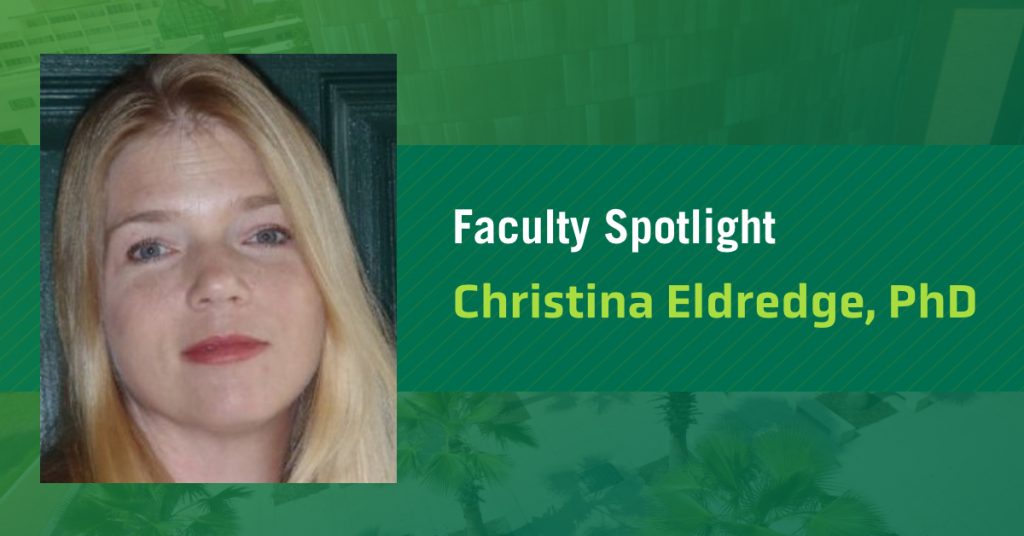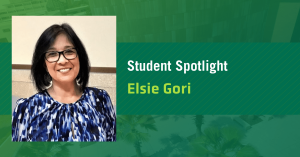For most medical school students, completing an MD means spending their lives working with patients and providing care. But for Christina Eldredge, practicing medicine was just one step along the road to a career in healthcare that continues to evolve.
Eldredge, now the professor of USF Health Online’s Introduction to Health Informatics course, cut her teeth practicing family medicine while enlisted in the U.S. Navy. It was there that she first realized that technology could be used to improve patient outcomes.
“I started out working with some of the most primitive forms of EHRs,” Eldredge says. “I describe them as the Atari of electronic health records. I was working with these billing systems, but I would use them more to manage my patients because I was practicing in more HMO type situations, so the goal was to improve patient outcomes and provide quality healthcare efficiently.”
Using EHRs to see if patients had picked up prescriptions or followed up on consultations with a physical therapist, Eldredge began to see the potential the systems held. While working in the Midwest, she did a fellowship in academic primary care research focused on health informatics while enrolled in a graduate program and earned a Master of Science in Medical Informatics (MSMI). Today, she is finishing up her doctoral program focusing on standards and interoperability.
After transferring to Florida with her husband, who works for Moffitt Cancer Center on the USF campus, Eldredge made some contacts in the School of Information and began teaching courses at USF. All the while she has continued to participate in a variety of research projects.
Among them was a project aimed at examining core competencies for health informatics graduate education. Eldredge was happy to begin working with USF Health because of the strength of its program and the footing it provides students in the areas of health information science and technology as well as professionalism, leadership skills and the ability to work in interdisciplinary teams.
“A strength of the USF Health’s Health Informatics Program is the interaction of the students in its online learning platform where students from all over the country are able to share ideas on these topics and, with the guidance of the professor, learn from diverse perspectives,” Eldredge says. “This virtual experience will strengthen their online professional skills and their ability to research and apply new knowledge in this innovative field which is constantly evolving.”
Other projects she’s been involved with include research focused on adverse event reporting in clinical trials, patient engagement and education tools for those with life-threatening allergies and healthcare consumerism.
This spring, Eldredge will also attend HIMSS2020, not just as one of the USF Health faculty who attend the conference each year, but also as part of HIMSS’ Professional Development Committee, dedicated to the development of a health IT workforce capable of pushing the industry forward.
“I joined the professional development committee because they had a lot of work in the area of early careerists,” Eldredge said. “I’ll be reviewing student poster submissions and attending and participating in the networking sessions for HIMSS20.”
As a professor and as someone who has experienced going back to school after a significant period of time away from academics, Eldredge feels USF Health’s graduate programs are the ideal fit for healthcare professionals looking to take their career in a different direction.
“USF Health’s informatics program is accredited and within their medical school,” Eldredge says. “This gives the student access to highly qualified health informatics professionals. You are able to get an academic medicine perspective from faculty members who are performing research and quality improvement in the field themselves. Our program faculty is also involved nationally in accreditation committees and professional development in the field of health informatics.”
Q&A with Dr. Christina Eldredge
It was a privilege to chat with professor Eldredge to discuss health informatics and technology. She is the instructor of the Introduction to Health Informatics course that is part of the master’s and graduate certificate offerings in health informatics. Here is the rest of our Q&A with her.
Q: You’ve been involved in a good amount of research and been published in several journals. One of the things you’ve looked at involves using a patient engagement approach to management of life-threatening allergies. Tell us a bit more about this project and what drew you to it?
A: At the time I was working in a community engagement research fellowship and we saw a need to educate teachers in schools about managing life threatening peanut and food allergies. It began as a method to educate & train teachers how & when to administer an epinephrine auto-injector to children who need to carry the auto-injector with them in case of exposure. The project then grew to develop a mobile health tool (a smart phone-based application) to educate adolescent students who need to self-administer in a community setting.
We were thinking about ways to increase access to quality health information and education and how could we scale training because there weren’t enough people to train all of these people. We’re still working on this project, but it’s been a great way to engage patients in the research. We use a lot of user centered design and do usability testing, so when we teach that part of the course about usability, I really reflect on the work we’ve done here. Some of the most important information for improving the app was based on what the patients themselves told us they needed. We use scenario-based educational training and patient-centered decision support tools to aid in patient health literacy and medical decision making beyond the clinic. Our hope is to improve access to quality education and training for patients with this condition.
Q: Of the research you’ve done, is there a project that had a big impact on you in terms of the way you view health informatics or the work that is done in the industry?
A: I’m working now on my dissertation and it involves clinical trials. This has really impacted me a lot because it has to do with adverse reactions to medications and how we record them in cancer trials. What I’m realizing from the research is that there is such a diversity in how we record them that it’s really hard to study them on a population level. It’s comparing apples to oranges. Probably the direction I’d like to take my career in the future is improving the way that we record adverse reactions in clinical trials. It needs improvement if we want to push population health. I’m focusing mostly on allergies because that’s where I’ve done a lot of my research in the past.
Q: You’ve also co-authored some research centered around healthcare consumerism. Can you talk a bit about how you see this growing trend impacting the future of healthcare and more specifically to your students, how this trend will affect what they do?
A: I think this is huge. We’re going to be doing more in this area. You may have seen the recent news that Google Health is hiring Karen De Salvo, the former National Coordinator for Health IT, as their new Chief Health Officer. In the past, Google had difficulty with sustainable projects involving consumer health. Our healthcare system is now taking steps toward a future where doctors work with patients and provide an overview of data that patients send to them. So it will be more participatory for patients and doctors will have to interpret patient generated data. All health informaticists will have to learn how to present data in a way that is not a fire hose of information, but pertinent information that impacts outcomes. I think this is probably the future, where healthcare consumers are demanding better care and to be participants so that they can see how their data is used and how it’s improving their health. If they don’t, they won’t keep giving data to healthcare providers.
Q: Your resume includes a period of time working for the US Navy. Tell us about that time in your life and what impact did interacting with servicemembers and their families have on you?
A: The Navy was a great time for me. Servicemembers are really dedicated to their job and their families are wonderful to work with. It’s been really exciting to work at USF because there’s a lot of veterans that are in the program and I really relate to them and what they’re going through. I understand overseas deployment issues and the challenges of how much they move. I admire their dedication to the country and all the sacrifices they make to keep this country what it is today. I’m glad I was in the Navy because it gives me a different perspective on Veterans that I don’t think I would have if I hadn’t done that.
Q: Healthcare technology is going through a growth period and likely will be for the foreseeable future. As someone who has practiced medicine, what developments are you excited to see in the coming years? Is there a particular area of research you are paying close attention to aside from what you are working on?
A: I’m looking at artificial intelligence. AI is going to depend on the quality of the data it receives. If the data going in isn’t good quality and clean, AI can’t actually tell you anything. What the future really comes down to is fine tuning that and making it become an aide to healthcare providers rather than a burden. We need to fine tune it, but I do think it’s going to be big in cancer research because we haven’t conquered that area yet and AI can help us target specific types of cancer to provide more of a precision medicine approach.



